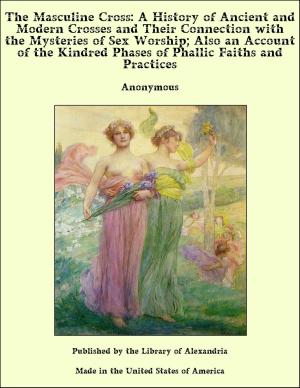| Author: | Edmund Mitchell | ISBN: | 9781465593900 |
| Publisher: | Library of Alexandria | Publication: | March 8, 2015 |
| Imprint: | Language: | English |
| Author: | Edmund Mitchell |
| ISBN: | 9781465593900 |
| Publisher: | Library of Alexandria |
| Publication: | March 8, 2015 |
| Imprint: | |
| Language: | English |
My lord was a man of noble heart and of high mental gifts. He ruled over his people not by fear of the sword, but by absolute justice, which he himself personally administered, every day holding audience so that grievances, even those of the most poor, might be heard and wrongs redressed. And his royal duties were shared by his wife, who, although she might sit behind the screen of the women's quarters, none the less shared in the counsels of state, and contributed words of wisdom in the direction of affairs. Never in my experience have I encountered such mutual love, trust, and devotion as subsisted between this pair. For no other woman in the world had Mirza Shah thought or regard or desire—I call him Mirza Shah, but that was not his real name. For reasons that will presently appear, I refrain from disclosing the identity of places and persons connected with my story. "Well, it was my privilege from the outset to be on relations of close intimacy with my master. He used to come through the palace gardens to the shrub-embowered tower which I occupied, and from the roof of which I nightly contemplated the heavens. For long hours he would abide with me, learning something of the stars while enjoying the cool of the night air after the heat and fatigues of the day. And many times of an afternoon the sultana, veiled, would come with her lord, and together they would seek to gain from me knowledge of the heavenly bodies and of divination. Some things I told to them, but others I withheld, which is just and right, for skill in astrology is hereditary, descending from father to son, and new minds are unprepared for such teachings, so that too much knowledge conveyed to outsiders may become a source of disturbance to themselves and perchance of danger and hurt to their fellow men. Thus, following the rules laid down for me by my grandfather, always, even when closely pressed with questions, did I exercise a discreet reserve. "Gradually the friendship accorded to me by my lord and his lady waxed stronger, and I found myself being admitted to some of their innermost thoughts. Thus did I come to learn the passionate longing of the wife to become a mother: for six years had she waited, but no child had blessed her love for her husband. As for Mirza Shah, just so soon as the subject was mentioned I could see the cloud of melancholy rest on his brow. And when, as time went on, sadness seemed to settle upon him continuously, I knew full well that this disappointment in his wedded life had at last taken complete possession of his mind, to the exclusion of all other matters. "And from the sultana's manner I could see the trepidation that filled her heart—the dread that her childlessness might in the end rob her of her husband's love. It was not given to me to look upon her face—to get more than a glimpse of her eyes as they shot an occasional glance at me through the parted folds of her veil. But in these glances I had read the prayers of entreaty that I should use all the spells of my art in her favour, so as to obtain for her from God the gift of a son. "Well, after a time an unexpected thing happened. Mirza Shah was absent from his home—gone on a full week's journey, engaged in the settling of some dispute on the confines of his territory. To me there came one afternoon the sultana, attended by one of her women—the most trusted one, I knew, for both were from the same country, near to Amritsar, where the famous rugs are woven. So much I had learned, and this further I also knew, that by birth the sultana was a Hindu, although on being wed to her lord as a little girl, she had of course embraced the true faith of Islam, in so far as it matters for a woman to have any religion at all.
My lord was a man of noble heart and of high mental gifts. He ruled over his people not by fear of the sword, but by absolute justice, which he himself personally administered, every day holding audience so that grievances, even those of the most poor, might be heard and wrongs redressed. And his royal duties were shared by his wife, who, although she might sit behind the screen of the women's quarters, none the less shared in the counsels of state, and contributed words of wisdom in the direction of affairs. Never in my experience have I encountered such mutual love, trust, and devotion as subsisted between this pair. For no other woman in the world had Mirza Shah thought or regard or desire—I call him Mirza Shah, but that was not his real name. For reasons that will presently appear, I refrain from disclosing the identity of places and persons connected with my story. "Well, it was my privilege from the outset to be on relations of close intimacy with my master. He used to come through the palace gardens to the shrub-embowered tower which I occupied, and from the roof of which I nightly contemplated the heavens. For long hours he would abide with me, learning something of the stars while enjoying the cool of the night air after the heat and fatigues of the day. And many times of an afternoon the sultana, veiled, would come with her lord, and together they would seek to gain from me knowledge of the heavenly bodies and of divination. Some things I told to them, but others I withheld, which is just and right, for skill in astrology is hereditary, descending from father to son, and new minds are unprepared for such teachings, so that too much knowledge conveyed to outsiders may become a source of disturbance to themselves and perchance of danger and hurt to their fellow men. Thus, following the rules laid down for me by my grandfather, always, even when closely pressed with questions, did I exercise a discreet reserve. "Gradually the friendship accorded to me by my lord and his lady waxed stronger, and I found myself being admitted to some of their innermost thoughts. Thus did I come to learn the passionate longing of the wife to become a mother: for six years had she waited, but no child had blessed her love for her husband. As for Mirza Shah, just so soon as the subject was mentioned I could see the cloud of melancholy rest on his brow. And when, as time went on, sadness seemed to settle upon him continuously, I knew full well that this disappointment in his wedded life had at last taken complete possession of his mind, to the exclusion of all other matters. "And from the sultana's manner I could see the trepidation that filled her heart—the dread that her childlessness might in the end rob her of her husband's love. It was not given to me to look upon her face—to get more than a glimpse of her eyes as they shot an occasional glance at me through the parted folds of her veil. But in these glances I had read the prayers of entreaty that I should use all the spells of my art in her favour, so as to obtain for her from God the gift of a son. "Well, after a time an unexpected thing happened. Mirza Shah was absent from his home—gone on a full week's journey, engaged in the settling of some dispute on the confines of his territory. To me there came one afternoon the sultana, attended by one of her women—the most trusted one, I knew, for both were from the same country, near to Amritsar, where the famous rugs are woven. So much I had learned, and this further I also knew, that by birth the sultana was a Hindu, although on being wed to her lord as a little girl, she had of course embraced the true faith of Islam, in so far as it matters for a woman to have any religion at all.















